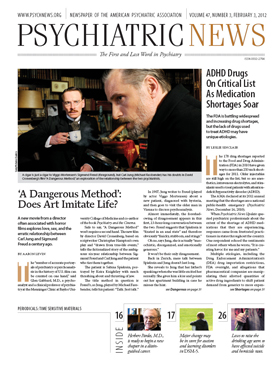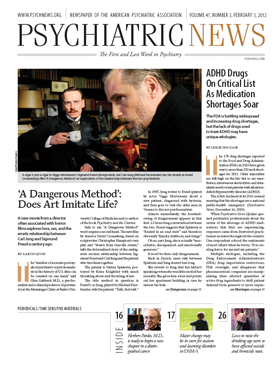When prescribing a second-generation antidepressant for treatment of major depression, it may be best to focus on side-effect profiles and onset of action, as new research suggests that the efficacy of these drugs is relatively comparable.
Featured in the December 6, 2011, Annals of Internal Medicine, the comparative effectiveness review examined 234 good- or fair-quality studies focused on the benefits and harms of 13 second-generation antidepressants: bupropion, citalopram, desvenlafaxine, duloxetine, escitalopram, fluoxetine, fluvoxamine, mirtazapine, nefazodone, paroxetine, sertraline, trazodone, and venlafaxine.
To assess the drugs’ efficacy, Gerald Gartlehner, M.D., M.P.H., of Danube University in Krems, Austria, led a team of researchers from Auburn University, the Ludwig Boltzmann Institute for Health Promotion Research in Vienna, RTI International, and the University of North Carolina at Chapel Hill in reviewing head-to-head randomized controlled trials lasting a minimum of six weeks.
The researchers concluded from their analysis that a lack of “clinically relevant” differences in the treatment outcomes associated with the individual medications precludes the recommendation of one drug over another for patients in either the acute, continuation, or maintenance phase of major depression treatment.
For the treatment of acute depression, some antidepressants were shown to have statistically significant response rates in relation to one another—for example, 65 percent of patients taking venlafaxine achieved a response compared with 60 percent taking fluoxetine, and 62 percent of patients receiving escitalopram achieved a response compared with 56 percent taking citalopram.
Additionally, the review of some mixed-treatment comparisons showed that patients had a greater response to escitalopram when compared with both duloxetine and fluoxetine. And seven fair-quality trials conducted by the manufacturer of mirtazapine indicated that the drug has a significantly faster onset of action than citalopram, fluoxetine, paroxetine, and sertraline.
However, 37 percent of all the patients treated for acute depression did not respond to their prescribed medication within six to 12 weeks of treatment, while 53 percent of all patients failed to achieve remission.
The researchers also failed to identify any statistically significant differences between the 13 drugs in patients with accompanying symptoms such as anxiety and low energy.
Similarly, little evidence was found to support significant differences in the efficacy of these medications when considering demographic factors such as age, sex, and race.
To evaluate the risk of harm associated with individual medications, the researchers examined data pooled from observational studies with at least 1,000 participants and a minimum follow-up of 12 weeks.
While similar side effects were experienced by 63 percent of patients taking second-generation antidepressants, the frequency of these adverse events varied by medication.
Venlafaxine appeared more likely to cause nausea and vomiting than all of the selective serotonin reuptake inhibitors (SSRIs) but less likely to be discontinued for lack of efficacy than the SSRIs.
Analysis of side-effect frequency also indicated that bupropion was less likely to cause sexual dysfunction than escitalopram, fluoxetine, paroxetine, and sertraline, while paroxetine was associated with more sexual dysfunc tion than other second-generation anti-depressants.
The study was primarily funded by the Agency for Healthcare Research and Quality. The researchers also noted that 77 percent of the studies included in their analysis were financially supported by pharmaceutical companies.

